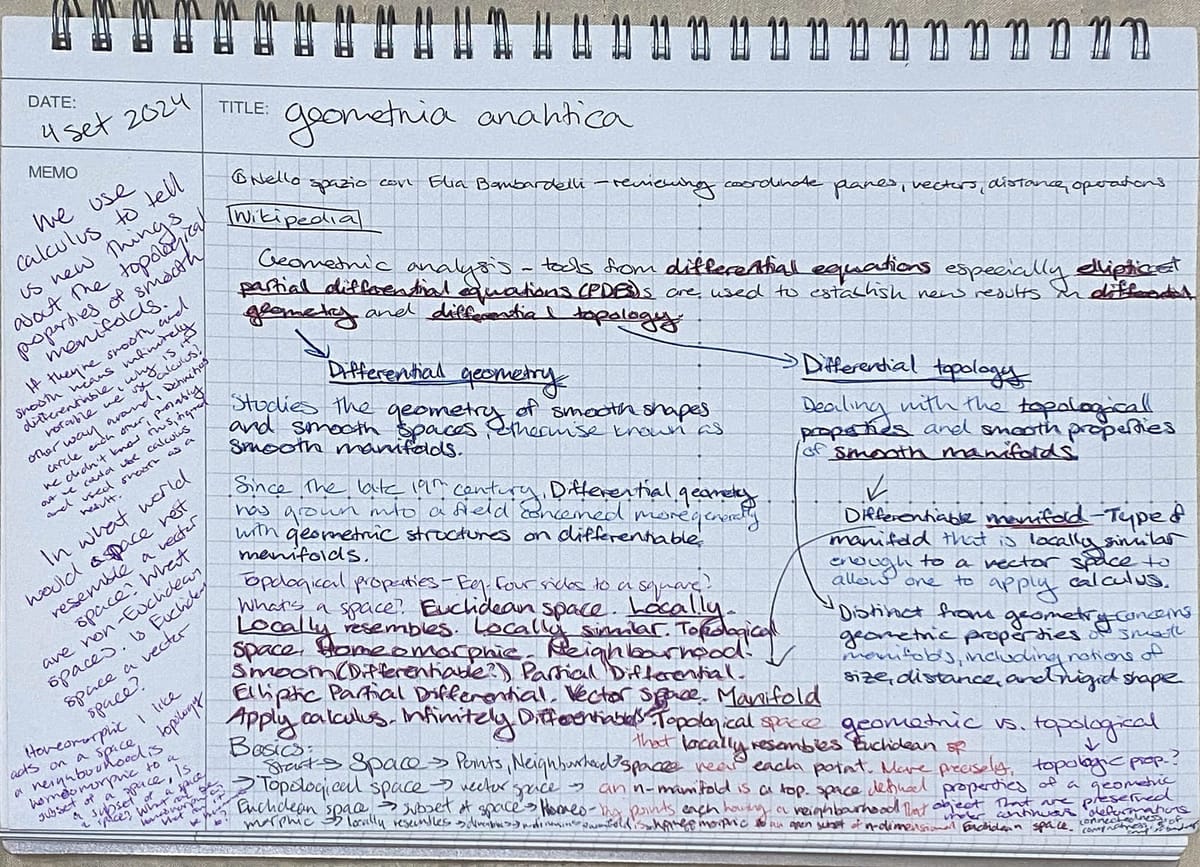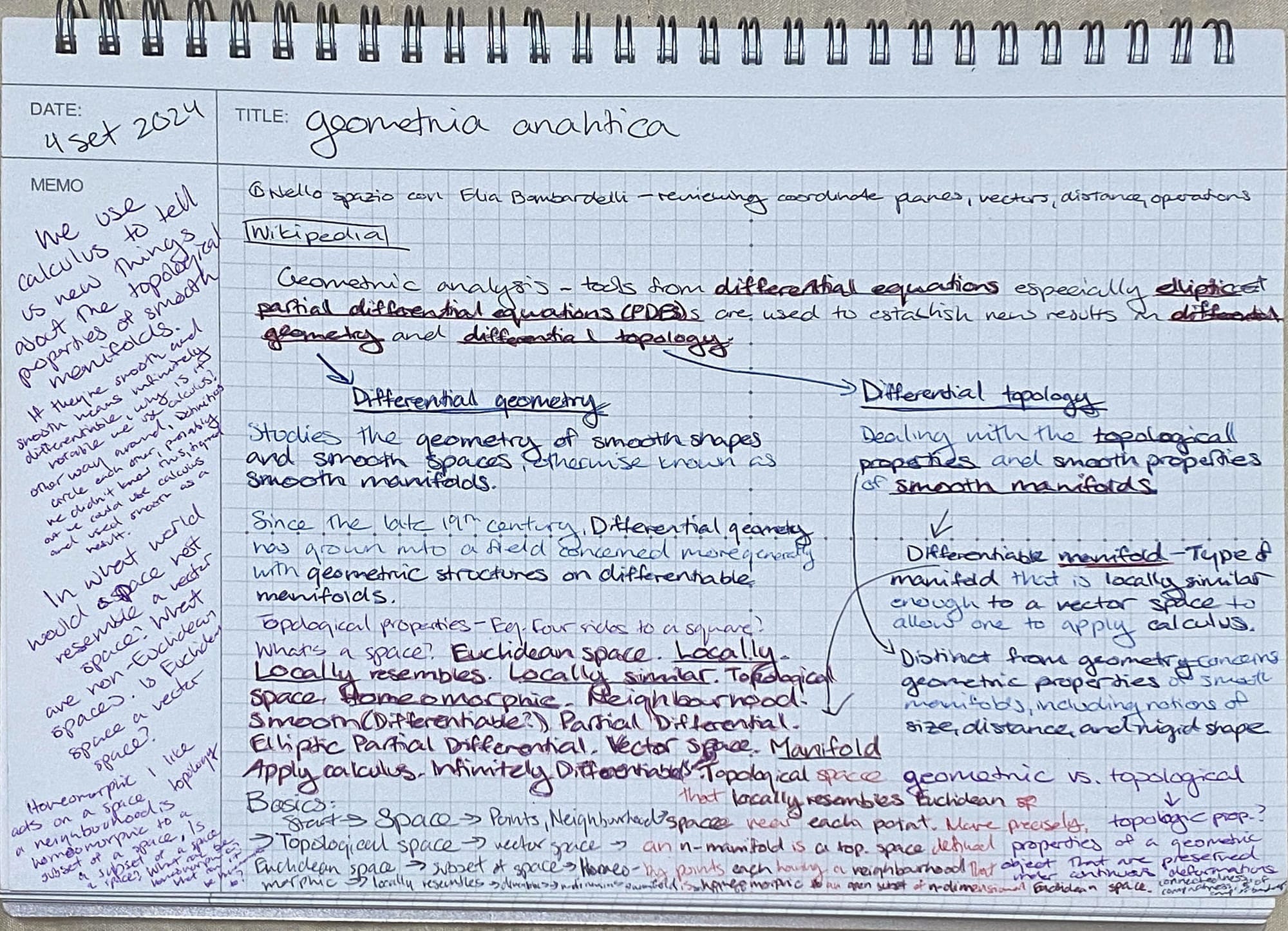Geometric Analysis: Day One

I'm quite excited for this one. I don't know what the end goal is other than to explore, but I'm very much looking forward.
I have found a topic I want to learn, something I'll delve very deeply into, as much as I can, and I have remembered to start documenting here before it goes too far (it becomes difficult to catch up, I loose motivation to document, etc.).
I am going to study Geometria Analitica. I think some of why I'm excited is how much content I can find in Italian and comprehend. In learning Italian, something I've wanted to do is develop adeptness in communicating mathematically and communicating on mathematics. Having briefly researched for 15 minutes already, the fact I may actually be finding this topic more accessible in Italian than in English (because of the resources available to those at a lower level of familiarity) is almost thrilling. I am combining two pursuits at once.
To begin, there is a lot I do not know. I do not know [precisely] what this field studies, what the popular objectives are, what the primary arguments and theories are, the vocabulary and vernacular, etc. I hope to establish all of that today. Conceptual understanding will follow or grow alongside. [19:16:05 4 set 2024.]
20:53:58
I will say again, I know nothing [or knew nothing] which makes this all the more exciting.
I first watched a YouTube video [have not finished it]. It's in Italian and it was the only video on the subject I found with vocabulary I recognised and concepts I had immediate comfort with. I decided let's start from the beginning properly and really get into this. When I begin, I like to start without videos, lectures, etc. because I need to move at my own pace, in my own directions, following my questions rather than the questions laid out before me.
Wikipedia has opened a lot. I think the most exciting part about learning is knowing nothing. Everything is an opportunity. There's not a word I can recognise or understand which means every single word is a spark to be caught, to set something on fire.
I'm being a bit hyperbolic, I knew some words, or at least I was familiar with them, but I lack[ed] understanding. First was Geometric Analysis. I read the first sentence and I didn't understand it so I didn't go any further. My key terms were "differential geometry" and "differential topology" so I went there. Differential geometry first. I read the first sentence and I didn't understand, but I went further. I finished the paragraph and the following sentence. On Differential topology. I read the first sentence and I did not understand. Temporarily, I did not go any further. The phrase "smooth manifolds" is a key noun in both of these articles so I went there. Googling smooth manifolds brought me to Differentiable manifolds. I don't know what a manifold is so next I went there. Beyond getting to Topology a little later, Manifold is the last article I opened.
I don't know a lot of these words. They are vaguely familiar, but they mean nothing to me, conceptually. I do know English, and I have basic logical intuition and grammatical understanding, so with these introductions, I can deduce.
I wrote down six sentences from Wikipedia. I used different colours in different ways and annotated. What most comes up in highlights and underlinings are nouns. Next most popular are adjectives. There are also a few verb phrases, modifying phrases, etc. that at minimum help me understand object A acts on object B or object C compares to object D. Before anything, I learn the logical rules for the objects you're describing, the systems they comprise, the worlds, etc., how they operate and then I can learn exactly what these objects are.
Once I began writing, researching terms, and writing more, I knew I would need to compile an easy reference. For example, as "locally" came up more than once in early sentences ("locally similar to", "locally resembles", etc.), I knew that would be top of the list.
Towards the end, I began a mapping? a directional list? I'm not sure, but I began something that would tell me which order to research and learn concepts in. This order is based on what I can deduce about which definitions rely on which others and which ones are the most basic. I also started talking to myself to begin summing what I'd gathered, asking any questions, and reasoning through confusion.
Notes:

Notes on Notes:
- Typically, I have a system to colour, but it morphed quite a bit in this process. Generally, {red – new critical information}, {green — important, perhaps not critical}, {blue – general summary and topic heading}, {purple – confusion, any questions, my own contributions}. Usually, I write in one colour or if text is in black I go over it with the chosen highlighting colour. That's not quite what happened today and I followed my instincts. I see things on the page before I have written them. I found it best to write what I saw as I saw it and trust where my mind goes. The end result is something seamless [for me] and something I can visually remember. Frequent rewriting in different colours also cements concepts and seems to have helped my memory.
- Nouns and modifiers are extracted in such a way that I realised I can reconstruct almost all definitions accurately only given any handful of these terms. I realised this is similar to my retelling of Pinocchio as I started with Italian while only referencing the words I had not known. Something about this works very well for me, and I know for others as well. It seems all the little words and prepositions in between that make up more grammatical structures than vocabulary terms really provide the bulk of a concept. And concept is easy to remember. A general idea of how something behaves and acts on another thing is easy to recall. The rest is a game of Mad Libs.
- Something like how we learn physics as children through play and the intuitive sense comes naturally and quickly long before we have vocabulary and "accurate" terms for each thing that is acting on another thing.
Now that I feel everything here makes sense and it is comfortable, I will learn definitions tomorrow. I should also say this all started in preparation for a seminar on Friday (less than two days).
21:55:56
22:28:44
Of all the things I love learning, I love learning how I learn.
22:34:28
If I start by saying I know nothing, I am free. I love to not know. I am free to learn as one who learns.